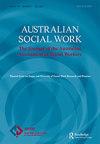澳大利亚社会工作:回顾与展望
IF 2
3区 社会学
Q2 SOCIAL WORK
引用次数: 0
摘要
2022年10月的《澳大利亚社会工作》标志着结束和开始。本期九篇论文的共同之处在于它们对社会工作教育、实践和政策的明确关注,以及回顾过去的价值,然后批判性地评估现在,以保持对未来的关注。蒂尔伯里等人(2022)回顾了20世纪60年代和70年代昆士兰州儿童保护政策和实践的历史,证明了在相当大的变化和动荡时期分析评估社会政策领域的价值。他们的历史眼光邀请我们从过去的事件中学习,以便尽可能地理解当前快速发展和动荡的背景。Harris(2022)和Jefferies等人(2022)的文章都着眼于未来,利用他们对社会工作者技术知识和技术使用以及模拟建模的当前缺陷的研究,强调了技术社会工作教育的必要性。这些文章表明,如果我们要让学生为当代实践做好充分的准备,并探索开发技术以使服务用户受益的方法,我们应该深思熟虑地考虑如何更好地理解和“策划”社会工作技术。Nouman和Azaiza(2022)以及Cordoba和Bando(2022)以不同的方式提醒我们,社会工作者已经是一个相互联系的世界中的活跃参与者,这个位置只可能增加并变得更重要。虽然Nouman和Azaiza(2022)已经报道了他们在以色列与阿拉伯-巴勒斯坦社会工作者的研究,但他们关于承认少数民族地位的重要性的信息在澳大利亚等国家引起了共鸣,因为世界的特点是持续(有时是被迫的)移民,人口分散和人口多样化。这些作者强调了支持、资源和培训的重要性,以确保这些少数群体有机会为政策制定做出贡献,从而为实践和服务提供做出贡献。科尔多瓦和班多(2022)的文章重点关注了社会工作与联合国可持续发展目标(sdg)的关系,他们报告了他们的创新学生安置项目,在这个项目中,学生们参与到可持续发展目标中,鼓励他们在全球背景下学习倡导、社会正义、平等和气候变化。这样的机会对他们现在和将来的实践都是不可或缺的。四篇文章带我们“回归基本”,提醒我们社会工作实践和直接服务的核心是人与人之间的关系。Morley(2022)强调了建立关系的中心地位,指出在以经济和技术合理性为特征的背景下,对建立和维持关系所需的时间和情感能量的认识可能会受到损害和威胁。在这样的环境下,从业者需要有能力“抓住”这个焦点,并且需要主管和导师的支持和加强来做到这一点。在这种情况下,Szeintuch(2022)扩展了“社会之爱”的概念,认为它与被确定为专业的实践大相径庭,从本质上讲,它是社会工作实践中关系的重要组成部分的表达。本文章由计算机程序翻译,如有差异,请以英文原文为准。
Australian Social Work: Looking Back and Looking Ahead
This October 2022 issue of Australian Social Workmarks both endings and beginnings. What unites the nine papers in this Issue is their clear focus on social work education, practice, and policy, and the value of looking backwards, and then critically evaluating the present in order to remain future-focused. Tilbury et al. (2022) review of the history of child protection policy and practice in Queensland in the 1960s and 1970s demonstrates the value in analytically appraising the social policy field during a time of considerable change and upheaval. Their historical gaze invites us to learn from past events in order to understand as best we might, the rapidly evolving and turbulent context of the present. The articles by Harris (2022), and by Jefferies et al. (2022) are both future-focused, using their research into current deficits in social workers’ knowledge of technology and the use of technology and simulation modelling, emphasising the need for social work education in technology. These articles suggest that we thoughtfully consider how both a better understanding and “curating” of technology for social work has become essential if we are to adequately prepare students for contemporary practice, as well as to explore ways in which technology might be developed to benefit service users. Nouman and Azaiza (2022) and Cordoba and Bando (2022) remind us in different ways, that social workers are already active players in an interconnected world, a location that is only likely to increase and become of greater significance. While Nouman and Azaiza (2022) have reported on their research in Israel with Arab-Palestinian social workers, their message about the importance of recognising the status of minority ethnic groups resonates in countries such as Australia, in a world characterised by ongoing (sometimes forced) migration, population dispersal, and diverse populations. These authors have highlighted the importance of support, resources, and training in ensuring that such minority groups have the opportunity to contribute to policy development and thereby to practice and service delivery. Social work engagement with the United Nation’s sustainable development goals (SDGs) was the focus of the article by Cordoba and Bando (2022), who reported on their innovative student placement project, during which students engaged with the SDGs, encouraging them to learn about advocacy, social justice, equality, and climate change within a global context. Such an opportunity will prove indispensable to their current and future practice. Four articles take us “back to basics”, reminding us that at the heart of social work practice and direct service is a human relationship. Morley (2022) has stressed the centrality of relationship building, noting that in a context characterised by economic and technical rationality, recognition of the time and emotional energy required to build and sustain relationships may become compromised and under threat. In such a climate, practitioners require the capacity to “hold onto” this focus, and the support and reinforcement of supervisors and mentors to do so. In this vein, Szeintuch (2022) expanded on the notion of “social love”, arguing that, far from it being at odds with practice identified as professional, it is, in essence, the expression of a vital constituent of relationships in social work practice.
求助全文
通过发布文献求助,成功后即可免费获取论文全文。
去求助
来源期刊

Australian Social Work
SOCIAL WORK-
CiteScore
4.20
自引率
16.70%
发文量
37
期刊介绍:
Australian Social Work is an international peer-reviewed journal reflecting current thinking and trends in Social Work. The Journal promotes the development of practice, policy and education, and publishes original research, theoretical papers and critical reviews that build on existing knowledge. The Journal also publishes reviews of relevant professional literature, commentary and analysis of social policies and encourages debate in the form of reader commentary on articles. Australian Social Work has grown out of the Australian context and continues to provide a vehicle for Australian and international authors. The Journal invites submission of papers from authors worldwide and all contributors are encouraged to present their work for an international readership.
 求助内容:
求助内容: 应助结果提醒方式:
应助结果提醒方式:


